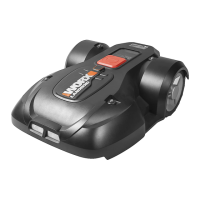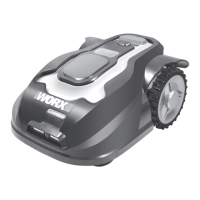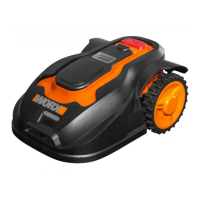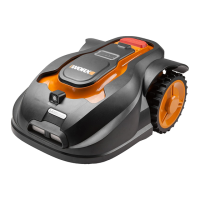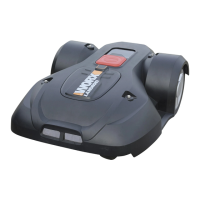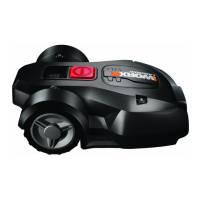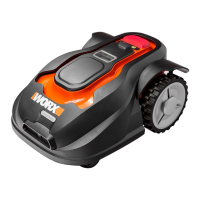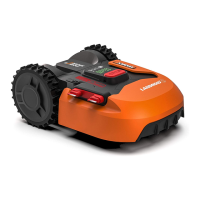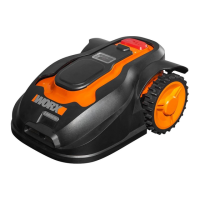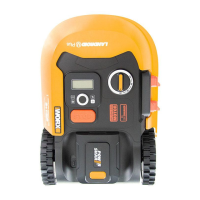9
3.2 How does my Landroid
®
L know
where to go?
Your Landroid
®
L is capable of doing things on its own. The Landroid
®
L
knows when it needs to go to its Charging Base (3) to charge, can
sense when it is raining, can stop itself if it senses a problem, and
knows to stop, drawback, and then turn around when it bumps into
something blocking its path or other object. The Landroid
®
L will also
automatically stop its Blade Turning Disc (16) from rotating if it is
lifted off the ground to prevent an accident.
A. Finding the Charging Base
When your
Landroid
®
L
needs to recharge, it will stop mowing and
follow the Boundary Wire (23) in an anti-clockwise direction back to its
Charging Base.
Landroid
®
L
is pre-programmed to mow the grass near
the boundary wire once a week.
If you want to mow the grass near the boundary wire at other time,
open the keypad window, press the home button and close the keypad
window.
Landroid
®
L
will stop mowing, locate the boundary wire and
mow the grass near the boundary wire while it locates the charging
station.So if you want to mow the grass near the boundary wire, just
press the home button and close the keypad window. We suggest you
use this function when the battery power is more than 75%. You can
check the battery power in the display.
B. Rain sensors
The Landroid
®
L is fitted with a Rain Sensor (12) at its rear that will
detect rain drops and tell the Landroid
®
L to stop mowing and follow
the Boundary Wire back to its Charging Base. (See Fig. B)
The Landroid
®
L is programmable to have a delay start function
(0 – 180 mins) when it rains. When the rain sensors are wet, the
Landroid
®
L returns to its docking station. Only when the rain sensors become dry will the Landroid
®
L begin the delay start
countdown or return to mowing immediately. If you want to command your Landroid
®
L to go ahead and start mowing again
before the time you have set under the “Rain start delay” function, then press the STOP Button (8), dry the Landroid
®
L off,
and close the Keypad Window (9) to tell it to mow again. See the Programming and Troubleshooting Guide for more details.
C. Sensing the boundary wire
The Landroid
®
L always obeys the border set by the Boundary Wire and uses two sensors at its front to sense when it is
getting close(See Fig. C). Before changing direction, the Landroid
®
L will overrun the Boundary Wire up to 25cm*.
*This is the recommended distance, because the Landroid
®
L cannot calculate the distance itself. Use the provided distance
gauge to ensure proper installation.
D. Starting and stopping while mowing
If you would like to command the Landroid
®
L to stop mowing, then simply press the STOP button (8) on top of the mower.
When pressed, the Landroid
®
L will open its Keypad Window and await your further commands. It will not begin mowing
again until you have press
and closed its Keypad Window. (See Fig. D, E)
If the Landroid
®
L senses that something is wrong, it will display a fault message on the Display (20), and will turn itself off if
it does not receive any input from the user within 20 min (for information on fault messages refer to the Programming and
E
D
B
C
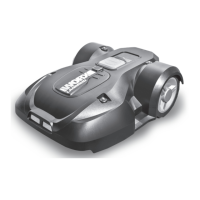
